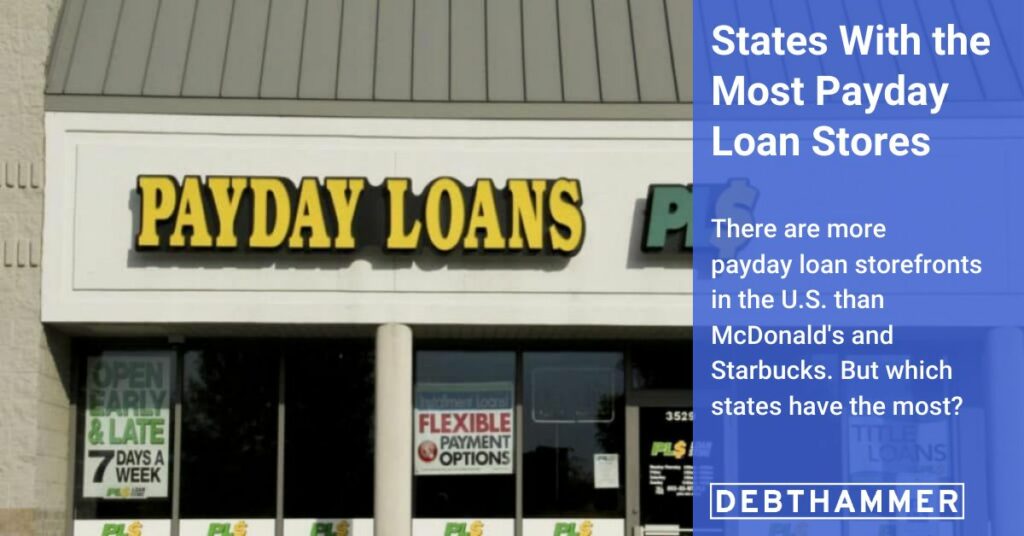The number of payday lenders in the U.S. is about 23,000 — twice that of McDonald’s and Starbucks. Though some states have made payday lending outright illegal, others are plagued by payday lenders that take advantage of desperate individuals when they’re at their lowest point. To learn where your state stands, explore the numbers below.
Table of Contents
States with the most payday loan stores
- California: 2,451
- Texas: 1,652
- Tennessee: 1,344
- Mississippi: 1,100
Stuck in payday debt?
DebtHammer may be able to help.
States with the most payday loan stores per capita
However, if you’re looking for the states with the highest ratio of payday lenders to residents, New Mexico tops the list. These ten states have the most payday loan storefronts per 100,000 residents:
- New Mexico: 41.78
- South Dakota: 40.01
- Mississippi: 38.67
- Alabama: 26.47
- Tennessee: 23.62
- Louisiana: 22.58
- South Carolina: 22.48
- Missouri: 22.47
- Utah: 19.12
- Kentucky: 17.49
READ MORE: How to figure out whether a payday lender is licensed in your state
State with the fewest payday loan stores
Rhode Island has the fewest payday loan stores, with just five in the entire state.
Cities with the worst payday lending problems
A 2021 DebtHammer report found that these are the top 10 U.S. cities with the biggest payday lending problems:
- Memphis, Tennessee
- Jackson, Mississippi
- Las Vegas, Nevada
- Baton Rouge, Louisiana
- New Orleans, Louisiana
- Nashville, Tennessee
- Chattanooga, Tennessee
- Dallas-Fort Worth, Texas
- Houston, Texas
- Birmingham, Alabama
Other important payday loan debt statistics
- People without a college degree, renters, those earning less than $40,000 a year, and people who are separated or divorced are the most likely to have a payday loan.
- Borrowers use payday loans to pay bills each month, including utilities, car payments, or other debt obligations.
- More than 80% of payday loans are rolled over, 75% are taken by those who have used them before and only 60% are taken just once
- Payday loans are more common in urban areas: 7% of Americans who live in cities have used a payday loan. That compares to 3% of suburban residents, 6% of exurban residents and 6% each of small-town and rural residents.
READ MORE: Payday loan debt statistics
Payday loans are dangerous
A payday loan is a short-term loan with exorbitantly high interest rates typically meant to be repaid by your next “payday.” In practice, they are a form of predatory lending where APRs can reach up to 600%, forcing borrowers to pay more in interest than what the original loan was. This traps many in a debt cycle where they are forced to take out a new loan to pay for the first loan, or they roll over the loan, causing the amount they owe to skyrocket. Borrowers can get payday loans from local storefronts or online. All you need to qualify is a checking account, an ID, and proof of income.
READ MORE: Pros and cons of payday loans
Payday loan interest rates
According to the Pew Charitable Trusts, the average payday loan borrower takes five months and multiple loan rollovers to repay a $300 payday loan. At 662% APR, it will cost $1,001 to pay back a $300 loan over five months.
This example isn’t an outlier either, as borrowers say the average APR they’re offered is 400%.
More than 90% of borrowers regret their original payday loan, so think twice before turning to a payday lender.
READ MORE: Payday loan interest rates
Payday loan protections
The Consumer Financial Protection Bureau has a rule in place that prohibits lenders from attempting to collect payments from people’s bank accounts in ways that may rack up excessive fees or deviate from expected agreements.
These protections apply to short-term loans, including payday loans, vehicle title loans, long-term balloon payments and high-cost installment loans.
Other consumer protections around payday loans are determined at the state level.
READ MORE: Does the government help with payday loans
States where payday loans are illegal
Payday loans are currently illegal in:
Arizona, Arkansas, Colorado, Connecticut, Georgia, Hawaii, Illinois, Maryland, Massachusetts, Minnesota (as of Jan. 1, 2024), Montana, Nebraska, New Hampshire, New Jersey, New Mexico, New York, North Carolina, Pennsylvania, South Dakota, Vermont and West Virginia plus Washington D.C. and Puerto Rico all have laws or interest rate caps in place that essentially make payday lending illegal.
Other states have rate caps that limit the APR lenders can charge you. The Center for Responsible Lending breaks down the laws in this map.
READ MORE: States where payday loans are illegal
Payday loans and the Military Lending Act
Payday loans are not permitted for active-duty service members and their dependents. Federal protections under the Military Lending Act (MLA) apply to all service members. Because of strict interest rate caps, most payday lenders refuse to lend money to service members.
Tribal payday lenders skirt state laws
Native American reservations in the U.S. are considered sovereign nations. This means they have sovereign immunity over the state laws in which they preside, so they don’t have to abide by them. Payday lenders take advantage of this loophole by offering online loans off-reservation, enabling them to charge more than 800% APR, with larger loan amounts and longer repayment terms to drag out the process.
Better alternatives
There are a multitude of alternative options you can turn to besides payday loans, including:
- Payday loan consolidation programs
- Cash advance apps
- Payday alternative loans
- Credit card cash advance
- Installment loan
- Peer-to-peer lending platforms
- Using your credit cards
- Debt consolidation loan
- Debt management plan
- Taking on extra work
- Borrowing from friends or family
All of these options will have much more favorable loan terms and interest rates than payday loans and should be strongly considered before even thinking about taking out a payday loan.
The bottom line
Payday loans are one of the worst and most damaging forms of predatory lending. The average payday loan has $520 in fees for an initial loan of $375, burying borrowers in debt before they even know what happened. Be wary of the payday loan laws in your state, and always explore alternative options if possible.


